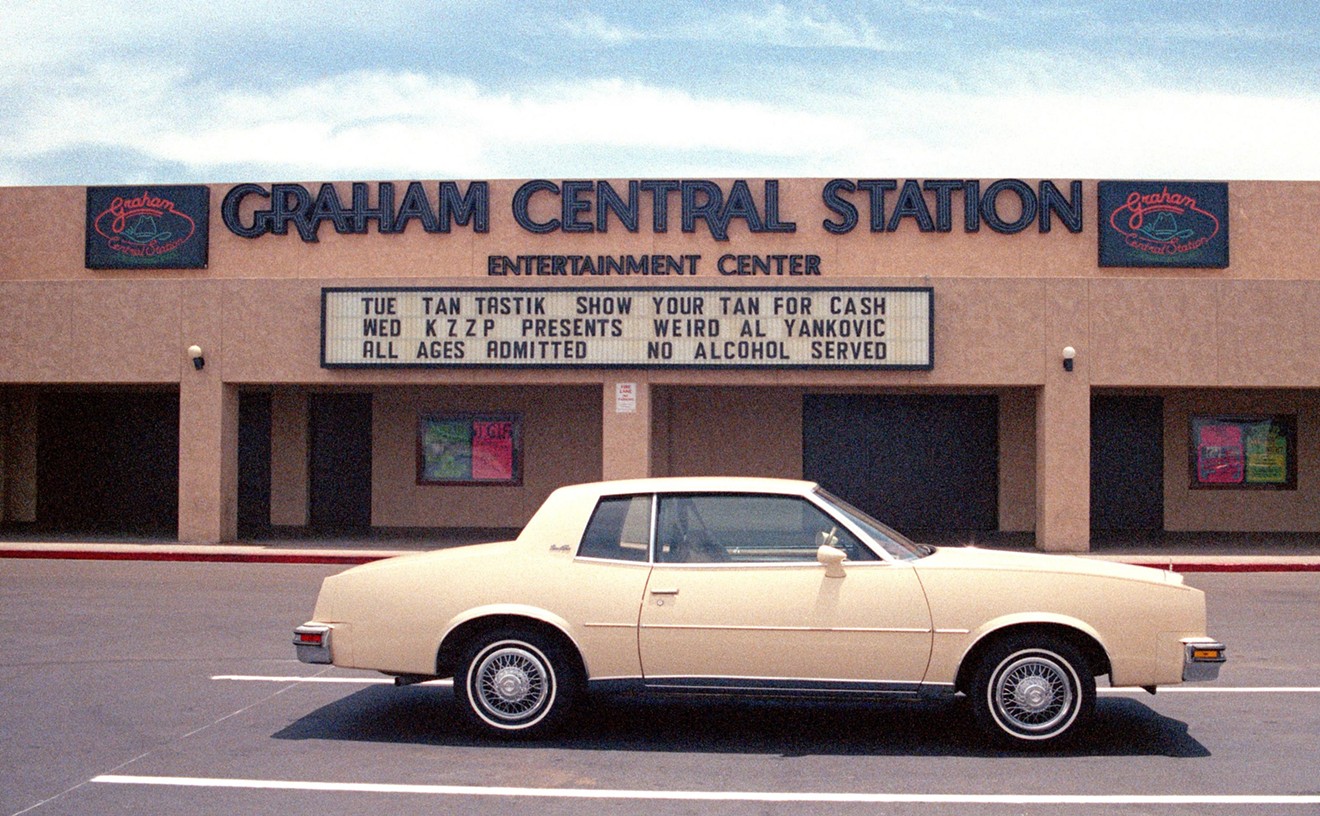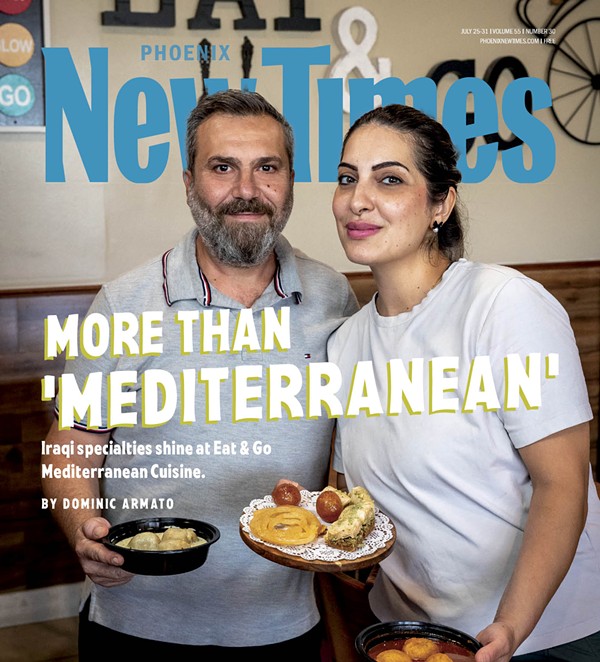Beyond CDs, DVDs, or video games, Zia customers have been known to bring in some rather oddball items, which Durham says is fun.
“It's almost like Pawn Stars, in the sense that you never know what's going to come through those doors,” Durham says. “Sometimes it's really weird, which is cool because the stuff we don't see every day is more exciting.”
Like the time someone brought in a CPR dummy or an official NASCAR tire. Both were bought by employees at Zia’s trade counter and wound up selling within days.
Zia Records has been buying and trading stuff since its first store opened in spring 1980. In those days, it was quality used records and cassettes, which Zia founder Brad Singer was eager to resell. Fast-forward to today and Zia has become an eight-store chain that buys everything from records, tapes, and CDs to books, video games, collectibles, and apparel. (They’ve even got masks and costumes for Halloween.)
“It's all part of the pop-cultural thing or lifestyle thing that Zia has expanded into [over the last decade],” Durham says. “Typically our customers aren't going to come in and be like ‘I only want CDs or movies or video games.’ And when they're walking through the store, they might see something else they're into.”
Many of these items have been bought by Zia employees at its trade counter, one of the chain’s hallmarks during the last 40 years. It’s been a lifeline for cash-strapped Arizonans or a place to sell off old collections of stuff. Trade counter employees have been notoriously discerning or fickle over the decades, much to the chagrin of customers.
In honor of this week's cover story on the history of Zia Records, we spoke with many current and former Zia employees who have worked behind the trade counters over the years. What follows is a collection of their stories and experiences, which include plenty of wild and crazy tales.
The Early Days of Zia’s Trade Counter
Toni Koch, early Zia employee: Zia was doing trades pretty much from the beginning. People would come in with boxes of used records, their family heirlooms, or whatever, and if they were of quality, we would buy them. [Zia founder Brad Singer] would always be on us about inspecting records, making sure they were quality, and if you didn't take them, you’d always make sure customers would know why in a kind [manner]. If they still wanted to throw them at you, you could always call the bosses and ask to give people an extra $2 credit or whatever.Sandra Singer, ex-wife of Zia Records founder Brad Singer: We had really good trade and markup. We were giving people 50 percent [of the value in] cash and two-thirds for trade, unlike most used record stores today.
Bobby Lerma, early Zia customer: The whole idea of being able to trade your music in again and either get money or get new music was pretty unique back then [in the early '80s].
Koch: Most people would come in with records, but sometimes they’d try to sell us other things. Kimber [Lanning] came in to the [first Zia in Phoenix] as she was a young teenager and put a bunch of buttons and was like, “I want to know if you'd be willing to trade me these button for one of your $4.99 12-inch vinyls.”
Kimber Lanning, former Zia employee/current owner of Stinkweeds Records: I was just this 13- or 14-year-old kid and I collected buttons from bands and stuff. I decided I'd rather have records, so I went in and wanted to know what Toni would give me for them.
Koch: I told her, “You know we don't trade buttons,” and she just said, “Well, you should.” We got into it in a good way and since we were the only girls in a [record store] pretty much full of guys, I thought, “What the hell?” and let her have the records for the buttons.
Cait Brennan, former Zia employee: People would bring in anything, and wouldn’t limit it to just records. Sometimes they'd try selling us clothes or old socks or whatever. Zia didn't take books back then, but people would bring in their high school textbooks.
Lanning: After I started working [at Zia], the weirdest experience I had with a trade was [getting] a banana peel and a couple of 8-tracks with no tape inside. I remember it was this dude with a tin-foil arrow on his head who looked pretty intimidating. It was the first time I had to turn someone completely away. He was like, “What do you mean you won't buy these?” And I just staring at him, going “I'm really sorry, I can't use them.” He was a foot taller than me and just got angry. I could literally hear my heart pounding in my ears, but he just stormed off.
Brennan: People were complaining about the [trade amounts] back then. Most of the regulars who bought an album for $3 the previous week and didn't dig it, they were fine. Ordinary customers found a box of Dad's albums in the attic and hauled it in thinking they'd leave with $1,000 got very irate. They wouldn't be happy if you didn't buy their stuff because it couldn't be resold or wasn't cool. They took it personally, like we were insulting their tastes by rejecting their Barry Manilow albums. It was like, “Dude, we've got 50 already.”
The Economics of Trading at Zia
Steve Mandel, former Zia employee: There were a lot of things you had to consider, like inventory levels in the [Zia Records] chain, so like if you're buying like a Jawbreaker CD, you gotta think, “Do we have a thousand Jawbreaker CDs throughout the chain already? Do we need this one?” A lot of it was just people that were upset that we wouldn't take their stuff in trade. If people thought we were giving them bad deals or something, they'd flip out. They didn't understand how much or how little their CDs were actually valued. We had to be on our toes. You had to earn your way up to working the trade counter.Mike Durham, former Zia store manager/current media buyer: It's all about supply and demand. Obviously, we're a business, and there's more that goes into [trade decisions] than making a little money. Typically, the more you have of something, the more the value goes down. If something comes across the counter we'd rarely see and it sells quickly, the value goes up. But if I've got a box of 25 of the same CD sitting in the backroom, the value goes down.
Mandel: A dude came in once and sidled up to us like he had a Fabergé egg or something. He hands me this CD and was like, "How much will you give me, my man?" And I was like, “This is a Young MC CD. We have a zillion of these.” He says “But it’s the import version. It’s worth 40 or 50 bucks easy." Then I had to point out to him that it wasn’t worth much because he’d carved his initials into the play area.
Jarrett Hankinson, current Zia CEO: We’ve seen all kinds of reactions to being told their stuff isn’t worth as much as they think. Some people are cool about, others have gone crazy.
Mandel: We had one guy who we found out eventually worked for a [record store] chain in California. And, apparently, they'd send him their overstock CDs and he'd go from store to store trying to sell them. At first, he was just this guy we'd see every couple of months who was really nice but would bring in boxes of CDs we'd never heard of before. And when we informed him we could only give him $4 to $5 because it was all garbage, he'd get really upset and leave in a huff.
Crazy Reactions and Secret Stashes
Zak Frankel, Zia’s security and events manager: The trade counters at Zia have definitely had some weird shit. You try to treat everybody extremely fairly but some people are just out of their fucking minds. We've had people coming in bleeding, tweakers, whatever. We had a guy who brought in a bunch of stolen stuff to the [now-closed Zia on Seventh Avenue and Indian School Road] and the cops came in right afterward. I think they’d been following him. The cops tried grabbing him and he ran right through the fucking window. like a cartoon character. "POW!"Mary Papenhausen, Zia marketing, promotions, and website coordinator: One of the funniest things about trade-in is [that Zia employees] will sometimes find notes and weird things like notes, pictures, and random stuff people left in their CDs or their vinyl and those things are left all over the counters or in the back offices at Zia. We never throw those things away. It's a weird amalgamation of thoughts and feelings from people.
Durham: One of my favorite things to come through was a "Weird Al" Yankovic record. When we slid the record out to inspect it, a whole pile of Victoria's Secret clippings came out with it. At some point, someone had hid their little stash of pictures inside. Oddly enough, that's not the only time it happened. I had an entire collection of metal cassettes come through and in every single one was a little stash of folded-up Playboy pictures.
Brennan: Sometimes you'd be checking on the condition of an album and a bunch of money would fall out. They'd forgot they'd shoved some cash in there. You'd give it back them and go, “Hey pal, I think you might've forgotten something in here.”
Frankel: We opened a bin of stuff once and it was full of bedbugs and they were all over the place. It was really gross. This was pretty recently, too.
Durham: We've seen stashes [of marijuana], too, where you open up a DVD case and go, "ooh, I don't think that was meant to be left in there." Sometimes we hand them back what's in there; most time we just close it up and give it back to them.
Rare Gems and Weird Trades
Frankel: We occasionally get in some really rare stuff. Those “butcher” cover [versions of The Beatles album Yesterday and Today] come in more often than you would think. I'm not talking necessarily monthly, but a few times a year. Sometimes the person wouldn’t realize how valuable it is and I have to stand there, and go. "Hey, this is actually an expensive record."Hankinson: I've come across a few “butcher” covers. That's been the big one that people will freak out about and it tends to be the crown jewel of [record stores].
Mandel: I got a lot of things that I really wanted personally in my collection, like old British punk rock. here's a band called Hawkwind that were big in England and not real big here. For some reason, Phoenix was the only city in America that liked Hawkwind, so I found a lot of those obscure imports come through.
Durham: In the last year and a half, I had a gentleman who was a huge international Nirvana collector, who decided to get out of that. I don't know the exact count, but I would say there were well over 300 different Nirvana records. He had every pressing from every country around the world for every record, even the test pressings and things like that. Most of that collection has sold. Over a period of six months, he definitely got paid very, very, very well, and was very happy.
Hankinson: It's been all over the map as far as what people will bring in.
Durham: I really love it when people lose the original jacket for a record and would create their own. In my office, I have a copy of Led Zeppelin II with a hand-painted cover. It's obviously amateur hour, but it's got like a weird, little mountaintop with eyes. It says, "Led" and then "Zeppelin II." I love those, kind of like one-off creative things, that somehow make their way to us.
Hankinson: We encourage people to bring in almost anything because we try to be as open-minded as we can with whatever we can sell. We bought a NASCAR tire once. A customer off the street just brought it in and [a Zia employee] bought it off him. I remember him saying we could get 50 bucks for it. I was like, “Are you fucking kidding me? You bought a fucking tire?” And then it sold in two days. It reinforced the nature of our business and that we could buy a lot of stuff. Our customers are looking for everything and not just music.
Durham: We had a CPR practice dummy that came in once. It was just weird enough and we were able to buy it at just the right price. And you know how quickly it sold? Hours. Someone came along and said, "That's weird and I want it."















